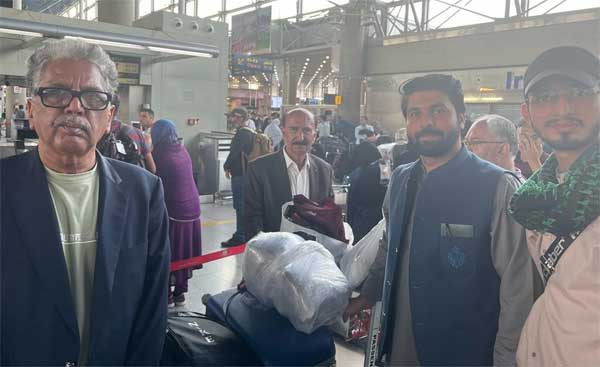Political Complexity: Pakistan has a diverse political landscape with various political parties and interest groups. This diversity can sometimes lead to prolonged debates and disagreements during the lawmaking process.
Bureaucratic Procedures: Like many countries, Pakistan has bureaucratic procedures that must be followed when creating and implementing laws. These processes can be time-consuming and involve multiple stages of review and approval.
Lack of Consensus: Consensus-building among political parties and stakeholders can be a challenge in Pakistan. Differences in opinion and conflicting interests can slow down the legislative process or lead to gridlock.
Social and Economic Issues: Pakistan faces numerous social and economic challenges that may divert attention and resources away from lawmaking. Issues such as poverty, security concerns, and infrastructure development often demand immediate attention and can impact the pace of legislative activities.
Capacity and Resources: Developing and implementing effective laws requires a robust infrastructure and resources. Pakistan, like many developing countries, may face limitations in terms of technical expertise, research capabilities, and funding, which can affect the efficiency of the lawmaking process.
Political Instability: Pakistan has experienced periods of political instability, including military interventions and frequent changes in government. These disruptions can impact the continuity and consistency of the lawmaking process.
Lack of Public Participation: Involving the public in the lawmaking process is crucial for a democratic society. However, there may be limitations in Pakistan when it comes to citizen participation and feedback in the formulation of laws. This can lead to a lack of inclusivity and hinder the effectiveness of the legislative outcomes.
Capacity Building: Enhancing the capacity of lawmakers, legislative staff, and government institutions involved in lawmaking is vital. Training programs and resources that focus on legislative drafting, policy analysis, and research can help improve the quality and efficiency of laws.
Corruption and Lack of Transparency: Corruption can undermine the lawmaking process by influencing decisions and priorities. It can also create a lack of transparency, erode public trust, and hinder the effectiveness of legislation.
Fragmented Legal Framework: Pakistan inherited a legal system with diverse influences, including British common law, Islamic law (Sharia), and local customary laws. This diversity can sometimes lead to complexities and challenges in harmonizing laws and creating a coherent legal framework.
Resource Allocation: Limited resources, both financial and human, can impact the lawmaking process. Insufficient funding and staffing can slow down the drafting, review, and implementation of laws.
Polarization and Political Deadlock: Political polarization and deadlock among different political parties can hinder the lawmaking process. Disagreements and lack of cooperation can lead to delays in passing legislation or even result in legislative gridlock.
Inadequate Infrastructure: Insufficient infrastructure, such as outdated parliamentary facilities, limited technology integration, and inadequate research and support services, can hamper the efficiency of the lawmaking process.
Legal Backlog: Pakistan, like many countries, may face a backlog of pending legislation and a slow judicial system. This backlog can create delays in enacting new laws and implementing reforms.
Lack of Public Awareness and Engagement: Limited public awareness about the importance of laws and the legislative process can hinder public participation and engagement. It is crucial for citizens to be informed and actively involved in the lawmaking process to ensure effective representation of their interests.
Complex Socio-political Dynamics: Pakistan is a diverse country with complex socio-political dynamics. Balancing the interests of different regions, ethnic groups, and religious communities can be challenging in the lawmaking process, particularly when dealing with sensitive or contentious issues.
External Influences: External factors, such as international relations and geopolitical considerations, can impact the lawmaking process. International agreements, obligations, and pressure from global actors may influence the direction and pace of legislation.
Cultural and Traditional Factors: Cultural norms, traditions, and societal expectations can influence the lawmaking process. Striking a balance between cultural values and the need for progressive legislation can sometimes be a delicate task.
Lack of Policy Research: Adequate research and data analysis play a crucial role in informing the development of effective laws. However, a lack of robust policy research institutions and limited access to data and information can hinder evidence-based lawmaking in Pakistan.
Influence of Interest Groups: Like many countries, Pakistan may face challenges related to the influence of powerful interest groups on the lawmaking process. Lobbying efforts by certain groups or industries can shape the legislative agenda and outcomes, sometimes at the expense of broader public interest.
Legislative Capacity: The capacity of the legislative body itself can impact the lawmaking process. This includes the availability of experienced lawmakers, committee structures, parliamentary procedures, and the ability to effectively debate and scrutinize proposed legislation.
Lack of Legislative Priority: Limited resources and competing priorities can result in delays or a lack of emphasis on certain areas of lawmaking. Urgent matters, political agendas, or short-term goals may take precedence over enacting comprehensive and necessary legislation.
Implementation and Enforcement Challenges: The effectiveness of laws depends not only on their formulation but also on their implementation and enforcement. Weak implementation mechanisms, inadequate resources for enforcement agencies, and a lack of coordination can undermine the impact of laws in Pakistan.
Public Trust and Perception: Public trust in the legislative process and government institutions can impact the acceptance and compliance with laws. If there is a perception of corruption, lack of transparency, or inefficiency in lawmaking, it can erode public trust and confidence in the legislative system.
Constitutional Constraints: Pakistan has a constitution that sets out certain parameters and procedures for lawmaking. Adhering to constitutional requirements and striking a balance between different branches of government can sometimes present challenges in the lawmaking process.
It is important to understand that these factors are not exhaustive, and the lawmaking process is influenced by a wide range of dynamics. Efforts to improve the lawmaking process in Pakistan involve addressing these challenges through reforms, stakeholder engagement, capacity building, and a commitment to good governance principles.
Insights into Pakistan’s legislative process and likely challenges




